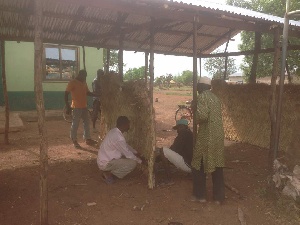 The teachers were posted to Kochim, a village with no electricity, water, health post or school
The teachers were posted to Kochim, a village with no electricity, water, health post or school
The Ghana Education Service in the Northern region posted 10 teachers to Kochim, a village in the Kumbungu district, where there is no school building.
The teachers have been in the community for two years now, always riding from their base in Tamale on motorbikes to sit idle behind a thatched structure put up by desperate parents as learning center to avoid zero interest in education among children in the village.
The village of more than 700 residents has remained isolated without electricity, water, road and other basic amenities for decades, leaving the poor farmers in unspeakable suffering.
Schoolchildren in this village attend school in nearby communities only in dry seasons and must be between 6 to 11 years before being enrolled chiefly due to the absence of school blocks.
The situation attracted the attention of an Iranian aid agency, Annur Organization for Humanitarian Service, who was constructing a mosque for the villagers, to build a two structured facility near the mosque to serve as Arabic learning center.
The local education directorate acting on advice of the district assembly went ahead to post ten teachers to handle about 150 children after the center was forcibly turned into a school building.
The district education director, Hajia Abiba Saaka answering questions about the education service policy of posting teachers said her outfit was not in charge of provision of infrastructure.
She said the directorate would cut down the number of the teachers in the community during next academic session if the situation remains unchanged.
“This is beyond me,” Hajia Abiba told Kasapa News.
“This is a nationwide issue, more to the point, we are not in charge of infrastructure; we are in charge of supervision,” she explained.
“So when the problem is resolved definitely we will have infrastructure there but for now, this is what I’m planning to do; in case we are able to get the infrastructure as quickly as possible and even we are sensitinzing the community to also do well and put up a temporal structure so that we will be able to occupy the overstaffed, over enrolled pupils,” the education director noted.
Residents are now extending the facility with an impoverished structure built with sticks and grass and calling for aid agencies to intervene.
Alhassan Issahaku, a teacher who has voluntarily taught the school for more than three years said the children were learning under a grass shade put up by a Christian faith in the area before moving into the mosque built by the Iranians.
“The government gave us teachers without a structure so we the community members decided to have a snail structure that would help teachers to have the classes but it is not enough. We have only two classes and the children are more than 100 we just want to manage and do the classes so that it can be three or four, so I appeal to government and NGOs to come and help us because children from six years cannot go to school unless 11-years during rainy season,” a resident told Starr News.
Mumuni Yakubu, a member of a committee in charge of education in the community also said parents are worried over the uncertainty of their children’s future as more and more generations multiply without formal education.
He disclosed that the youth especially female teenagers continue to drift out from the area to towns and cities in search of improved conditions. He said most of them eventually returned with pregnancy or serious health complications, and therefore called for immediate construction of school building in the community.
According to Mumuni, the local assembly which is in charge of providing infrastructures, said it has no funds to build a school for the community.
- Conditions of Service: Don’t blame us for any brouhaha on pre-tertiary level – Teacher Unions
- Meet the only teacher taking care of an entire school in Afram Plains
- U.S. provides GH¢2.8 Million to aid licensing, monitoring and evaluation of schools
- Each One, Teach One: ADN kicks off Lifeline Literacy Project
- Parenting with a difference 101: Cheating in classwork a threat to national development
- Read all related articles












